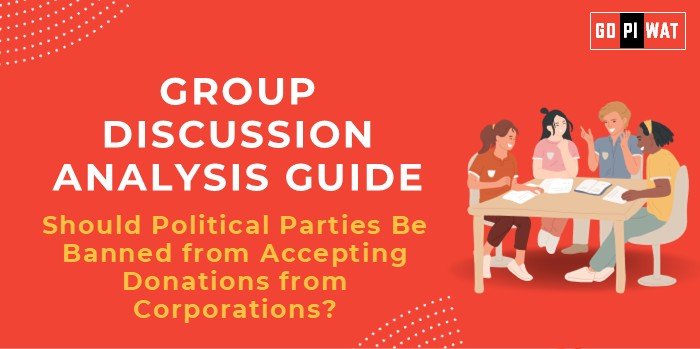📋 Group Discussion (GD) Analysis Guide
🌟 Topic: Should Political Parties Be Banned from Accepting Donations from Corporations?
🌐 Introduction to the Topic
Opening Context: Corporate donations play a pivotal role in modern politics, shaping campaign dynamics and raising questions about democratic integrity.
Topic Background: Across the globe, the debate on regulating political donations stems from concerns over undue corporate influence on policymaking.
📊 Quick Facts & Key Statistics
- Global Trends: Corporate PACs in the U.S. contributed $344 million during the 2022 midterms, with 55% going to Republicans and 45% to Democrats.
- Indian Context: The BJP received ₹720.407 crore (92% of total donations) from 2,025 corporate donors in 2019-20.
- Transparency Index: Nations with stringent donation regulations rank higher on the Corruption Perceptions Index, indicating lower corruption levels.
- Legislation: The UK bans corporate donations outright, while the U.S. allows them under regulated frameworks.
- Public Opinion: In the U.S., 77% of citizens advocate for limits on political donations.
📌 Stakeholders and Their Roles
- Political Parties: Depend on corporate donations for campaign financing but risk compromising policy impartiality.
- Corporations: Provide financial backing to parties, often expecting policy benefits.
- Government and Regulators: Responsible for establishing and enforcing donation transparency and fairness.
- Citizens and Civil Society: Advocate for ethical campaign financing to ensure democratic integrity.
✅ Achievements and Challenges
✨ Achievements
- Enhanced campaign resources through corporate donations.
- Global reforms like the UK’s elimination of corporate funding promote transparency.
- Rising public scrutiny has pushed political parties to disclose funding sources.
⚠️ Challenges
- Policy bias due to favoritism towards corporate interests.
- Transparency issues, such as India’s criticized electoral bond system.
- Undermined public trust in governance due to unregulated donations.
🌍 Global Comparisons
- UK: Prohibits corporate donations, relying on state funding for campaigns.
- USA: Allows regulated PAC contributions but faces criticism over lobbying influence.
Case Study: India’s Electoral Bonds
Designed to provide anonymous corporate donations but criticized for lacking transparency.
💡 Effective Discussion Approaches
- Opening Approaches:
- Start with impactful data: “Corporate PACs in the U.S. donated $344 million in 2022, sparking debates over democratic fairness.”
- Highlight a comparison: “Unlike the UK’s strict regulations, India and the U.S. allow significant corporate funding with varying levels of oversight.”
- Pose a provocative question: “Can democracy truly thrive if corporate interests drive political funding?”
- Counter-Argument Handling:
- Challenge: “Banning corporate donations might reduce resources for campaigns.”
- Rebuttal: “Public funding and individual contributions can fill the gap, as seen in the UK.”
📈 Strategic Analysis of Strengths & Weaknesses
- Strengths: Promotes fairer electoral processes and reduces corruption risks.
- Weaknesses: Loss of significant funding sources for parties.
- Opportunities: Introduce public financing and crowd-sourced campaigns.
- Threats: Resistance from corporates and political entities reliant on these funds.
🗨️ Structured Arguments for Discussion
- Supporting Stance: “Corporate donations undermine democracy by fostering policy biases.”
- Opposing Stance: “Corporate funding ensures robust campaigns in resource-intensive elections.”
- Balanced Perspective: “Regulated corporate funding with transparency can balance resources and integrity.”
📚 Connecting with B-School Applications
- Real-World Applications: Ethical dilemmas in corporate governance and politics; campaign finance as a business law case study.
- Sample Interview Questions:
- “How can corporate funding impact governance?”
- “What alternative funding mechanisms can be implemented for political campaigns?”
- Insights for Students: Ethical leadership in fundraising; interplay between governance and corporate social responsibility.


